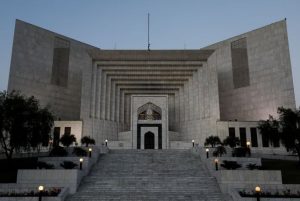Civilian groups take on military tribunals.
Asks the Supreme Court to overturn civilian trials conducted under the Pakistan Army Act of 1953.

Some members of civil society in ISLAMABAD have petitioned the Supreme Court to declare civilians’ trials by military courts to be “void ab initio and of no legal effect” for their claimed roles in attacks on civil and military properties and memorials on May 9 and 10.
After the arrest of the Pakistan Tehreek-e-Insaf (PTI) leader on May 9, protesters took to the streets and vandalized and burned military installations. On May 16, the country’s civil and military leaders endorsed a decision by a corps commander to try those responsible for the vandalism and arson.
Subsequently, the civilian authorities turned over dozens of persons to the military authorities for summary trial, most of whom were PTI workers and supporters who had been arrested during the major crackdown.
On Saturday, Advocate Faisal Siddiqi filed a petition with the Supreme Court alleging that those selected for court martial in the wake of the vandalism on May 9-10 were picked at random. The petition cited FIR No. 96 of 2023 from the Police Station on Sarwar Road in Lahore.
FIR No. 96 of 2023 alleges violations of Sections 302, 324, 395, 436, 452, 440, 427, 353, 186, 290, 291, 153, 152, 148, 149, 147, 109, 505, and 120B of the Pakistan Penal Code, 1860, and Section 7 of the Armed Terrorism Act of 1997 by fifty civilian accused persons with identical roles.
No violation of the Pakistan Army Act, 1952, Read with, the Official Secrets Act, 1923, was mentioned in the aforementioned FIR No. 96 of 2023, and the same roles were assigned to all fifty civilian accused persons nominated in the FIR. However, the [authority] arbitrarily and discriminatorily sought delivery of custody of only fifteen civilian accused persons.
Petitioners wanted to know if Sections 2(d)(ii) and 59(4) of the Pakistan Army Act, 1952 read with Sections 3, 3A, 7, and 9 of the Official Secrets Act, 1923 allow for civilian trials in connection with the alleged offenses recorded in FIR No. 96 of 2023 and other like FIRs all arising out of the alleged criminal acts committed on May 9-10.
The question was also raised as to whether or not Article 25 of the Constitution is being violated by civilian trials in military tribunals until such time as lawful and appropriate guidelines are drafted to establish the discretion not to arbitrarily try civilians under the Pakistan Army Act, 1952.
If the right to a fair trial and due process, including a statutory right of appeal to an independent court with its full power of appellate review, is not guaranteed by appropriate legislation, then do trials of civilian accused persons violate Article 10-A, Article 25, and Article 175 of the Constitution?
The question is “whether all civilian trials…should be transferred to appropriate criminal courts of general and special jurisdiction” (i.e., under the Criminal Procedure Code of 1898, the Anti-Terrorism Act of 1997, and by a magistrate under Section 13 of the Official Secrets Act of 1923) for trials in accordance with such relevant law and in compliance with the fair trial and due process rights guaranteed by the Constitution and law.
Petitioners also questioned the court if the CIA, NSA, or other intelligence agencies may be used by the federal government to apprehend and detain political leaders and workers.
They also wanted to know if it violates Articles 10A, 15 and 175 of the Constitution of 1973 for intelligence officials to be present on any court grounds without the court’s consent.
They asked the court to rule that it is illegal to prosecute civilians under Section 2(d)(ii) and 59(4) of the Pakistan Army Act, 1952 read with, Sections 3, 3A, 7, and 9 of the Official Secrets Act, 1923 in relation to alleged offenses recorded in FIR No. 96 of 2023 and other like FIRs.
Thus, “all actions taken pursuant to such investigations or trials of civilian accused persons are null and void from the outset.”
Until and unless legal and reasonable guidelines are framed to structure the discretion not to arbitrarily try civilian accused persons under the Pakistan Army Act, 1952, they asked the apex court to declare that trials of civilians by military courts violate Article 25 of the Constitution.
Until the right to a fair trial and due process, including but not limited to a statutory right of appeal to an independent court with its full power of appellate review, is provided through appropriate legislation, the trials of civilian accused persons “are violative of Article 10-A, 25 and 175 [of the] Constitution,” it read.









































